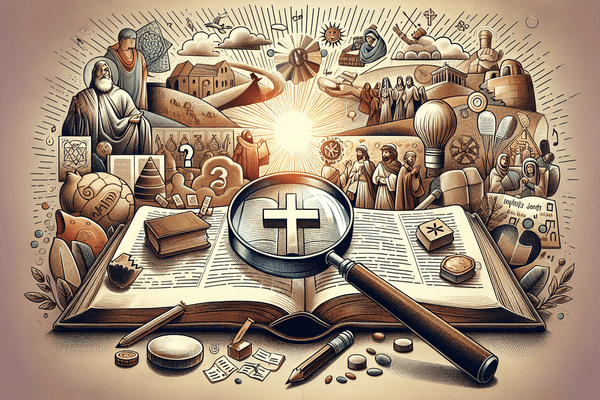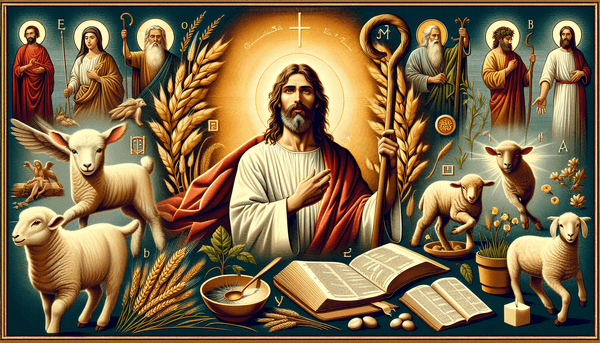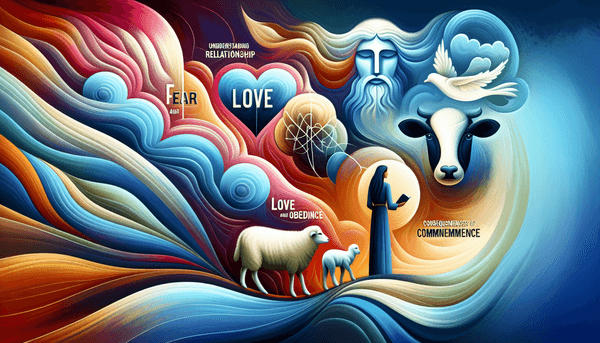Divine Encounters: Jacob and Moses
The Bible is replete with stories of individuals encountering the divine in profound and life-changing ways. Jacob's wrestle with God, resulting in his renaming to Israel, signifies a transformational moment of struggle and blessing as recounted in Genesis 32:30. Meanwhile, Moses' encounter with God on Mount Sinai reveals the paradox of divine intimacy and transcendence. Moses' desire to see God's glory is met with a revelation that is both intimate, as God proclaims His name and nature in Exodus 34:6-7, and transcendent, as God declares that no one can see His face and live, as stated in Exodus 33:20. These narratives underscore the tension between humanity's longing for God and the majesty of the divine, which is beyond full human comprehension. For a deeper exploration of faith and the divine nature, consider reading our comprehensive guide on the intricacies of Christian theology.
Reasons to Believe in Jesus
The significance of Jesus Christ in the Christian faith cannot be overstated. He is revered as the Son of God, the fulfillment of ancient prophecies, and the savior of humanity. Belief in Jesus is grounded in His historical presence, moral teachings, and the transformative impact of His love and sacrifice. The Gospel of John encapsulates the essence of this belief in John 3:16, highlighting God's love for the world and the gift of eternal life through Jesus. Additionally, the writings of Paul in Romans 5:8 and 1 Peter 2:24 speak to the profound nature of Jesus' sacrifice and its implications for human sin and redemption. The call to believe in Jesus is rooted in the historical witness of His life, the ethical dimensions of His teachings, and the enduring message of hope and salvation.
Addressing Biblical Discrepancies and Interpretations
The Bible, though divine, was penned by human hands and reflects the complexity of human experience and understanding. Discrepancies and differing accounts within its pages invite readers to engage with the text thoughtfully and critically. In approaching these differences, it is vital to consider the context, culture, and intent of the biblical authors. Scripture itself attests to its divine inspiration and usefulness for teaching, as Paul writes in 2 Timothy 3:16-17. Moreover, understanding the nature of prophecy and its interpretation, as described in 2 Peter 1:20-21, aids in navigating the complexities of biblical narratives. Ultimately, it is through the blending of faith and scholarship that one can discern the messages and truths contained within the biblical text.
Conclusion
The exploration of the Bible's narratives and teachings reveals a text that is as complex as it is profound. Historical accounts, prophecies, and personal encounters with the divine, such as those experienced by Abraham, Enoch, and Lot, are interwoven with themes of redemption, covenant, and faith. The crucifixion of Jesus stands at the heart of the Christian message, a testament to God's love and the fulfillment of ancient promises. These encounters highlight the paradoxical nature of God, who is both near to us and beyond our complete understanding. Through the person of Jesus, believers find compelling reasons to hold fast to their faith, and in addressing discrepancies within the text, they are reminded of the importance of context and the depth of divine revelation. As we continue to engage with the Bible, we are invited into a deeper relationship with the God who is both the author and the subject of its pages.
FAQ
Q: In which parts of the Bible is the crucifixion of Jesus described?
A: The crucifixion of Jesus is described in the New Testament Gospels: Matthew (Mt 27:27-51), Mark (Mk 15:22-41), Luke (Lk 23:23-49), and John (Joh 19:16-42).
Q: Who are the eyewitnesses of Jesus who wrote books in the Bible?
A: The apostles Matthew and John were eyewitnesses of Jesus and wrote the Gospels of Matthew and John, respectively. The Gospels according to Mark and Luke, while not penned by eyewitnesses, were informed by apostolic testimony and early Christian tradition.
Q: How do the accounts of the creation of animals and humans differ between Genesis 1 and Genesis 2?
A: In Genesis 1, humans are created after the animals on the sixth day. Genesis 2 provides a more detailed account where Adam is formed before the animals are brought to him to be named, suggesting a different order of creation events.
Q: Why should we believe in Jesus?
A: Christians believe in Jesus because of His unique identity as the Son of God, His fulfillment of biblical prophecies, His moral teachings, His sacrificial death and resurrection, and the transformative impact of His love and grace on individuals and the world.






